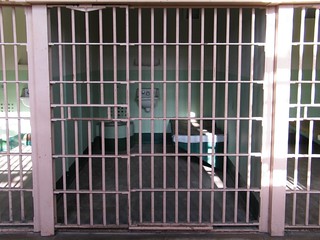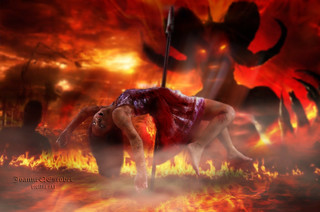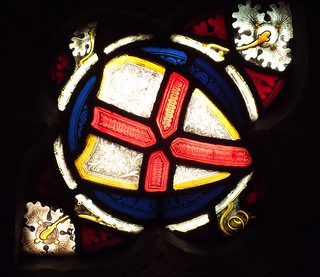Today's podcast
Previously:
God has
sent a
bunch of
plagues to
Egypt to try to get the Pharaoh to let his people go.
Last chapter he warned of the final plague, the death of all the firstborn in Egypt.
The Passover (v. 1-28)
God declared the current month to be the beginning of the year. Then he said that on the tenth day of the month, every house (or if a house is small they can combine with a neighbor) shall take a year old male lamb without blemish. Wait until the 14th of the month and everyone will kill their lamb at twilight.
The specificity of the request for the sacrifice caught my attention. In fact, the whole idea of God wanting sacrifice seems odd. Perhaps that's just because we don't do sacrifices any more, but it just seems so strange.
From Guzik:
In this way, the lamb became part of the family. By the time it was sacrificed on the fourteenth it was cherished and mourned; God wanted the sacrifice of something precious.
I suppose some people would become fond of their lamb, but how attached are you really going to get to an animal that you know is being sacrificed in four days?
Take some of the blood from the sacrifice and put it on your door. Eat the meat with unleavened bread and bitter herbs. Roast the meat, don't boil it or eat it raw, if any meat is uneaten burn it.
Again, the specificity seems strange to me.
From Guzik:
As the blood was applied to the top and each side of the doorway, this blood dripped down, forming a figure of a cross in the doorway.
Wait what? How could it form a cross? Perhaps I'm picturing this wrong. So I went back and looked at verse 7 which says
take some of the blood and put it on the two doorposts and the lintel of the houses
I had to look up what a lintel is, but it is basically just the top of the door. Put blood on that and the doorposts and you get an arch, not a cross. It's amazing to me how desperate some Christians are to insert Jesus into the old testament.
 |
| google image search for passover blood |
I then did a google image search for "passover blood". Most are what I was expecting, but one picture near the bottom right looks like a cross. Are they supposed to put the blood on the door as well? I had to go back and reread the text.
7 "Then they shall take some of the blood and put it on the two doorposts and the lintel of the houses in which they eat it
Doesn't say anything about the door. I suppose they aren't forbidden from putting it on the door, so if they do you get a cross. But it definitely isn't inevitable as the rest of the images reveal.
And more from Guzik:
As our Passover sacrifice, Jesus had to come into direct contact with the "fire" of the Father's judgment on our behalf, and the bitterness of the cross is reflected in the bitter herbs.
Wow, again, inserting Jesus into the old testament. A few quick google searches found better answers. This site explains that the fire is symbol of what was happening with the exodus. If you cook with fire you separate ingredients, if you boil the meat will take on aspects of the water (such as spices I suppose). This site explains that he bitterness reminds us of the bitterness of the slavery the Israelites are escaping from. Honestly, I find the explanation from Guzik completely ridiculous, and I imagine a Jew would find it downright offensive. In fact, I showed this to my wife (who is Jewish) and she made a pretty funny "what the fuck!" face.
One more thing from Guzik here:
For the first Passover, the unleavened bread was a practical necessity - they left Egypt in such a hurry there was no time to allow for the dough to rise.
That just makes no sense (although I looked around at other sites and it seems to be the common explanation). For one thing, they were told ahead of time to eat unleavened bread. It's not like they were cooking it normally and they had to leave unexpectedly or something. If timing was the issue they could have just started making it earlier.
Leaven was also a picture of sin and corruption, because of the way a little leaven influences a whole lump of dough, and also because of the way leaven "puffs up" the lump - even as pride and sin makes us "puffed up."
That, on the other hand, is actually some decent symbolism. I could believe that this is really the reason for the unleavened bread.
God will pass through the land of Egypt and kill all of the firstborn, except the blood will be a sign for him to skip your house.
Why exactly does God need the blood on the doors to know which houses to skip? It's almost like he's not all knowing. I suppose an answer I would have given to this when I was a Christian is that God knew who was going to put the blood on their door ahead of time, and so he is still all knowing, but there is value in having them actually do it. It's not too dissimilar from God calling out to Adam and Eve to find out where they are in the garden after they ate the fruit. It seems much more likely to me that the God written about here wasn't supposed to be all knowing, but I also know that this explanation would have satisfied me as a Christian.
 |
English: A depiction of the Matza.
עברית: תיאור של מצה.
(Photo credit: Wikipedia) |
Keep this day as a memorial throughout generations. For 7 days don't eat leavened bread, remove it from your house on the first day, for if anyone eats leavened bread during that time, they will be cut off from Israel.
God damn that is harsh.
Have a holy assembly on the first and seventh days, no work shall be done on those days except to prepare food, but only what people need to eat.
No leftovers?
Then they repeat the instructions 3 times. Wow, God really doesn't want people to eat leaven, got it.
Then Moses calls over the elders and repeats the instructions again. Why the repetition?
The Tenth Plague: Death of the Firstborn (v. 29-32)
As promised, God kills all of the firstborn. From the Pharaoh to the prisoners, every house has someone dead. Even the livestock have their firstborn killed.
I really don't understand why there needs to be so much death. It works in the story, but is there really no other way? I suggested in the last chapter that as a Christian I would have probably accepted a "no half measures" narrative to explain this. But damn, it's hard to believe an all powerful God can't find a better solution.
Interesting note from Guzik:
This plague was directed against two significant Egyptian gods. First, Osiris was the Egyptian god thought to be the giver of life. Second, against the supposed deity of Pharaoh himself, because his own household was touched
As before, it seems that this is really a pissing match between various gods.
An inscription was found in a shrine connected with the great Sphinx that records a solemn promise from the Egyptian gods vowing that Thutmose IV would succeed his father Amenhotep II - whom many believe to be the pharaoh of the Exodus. Why did they make such a unique, emphatic promise from the gods that something so natural would happen - the eldest son take his father's place as Pharaoh? Undoubtedly, because Thutmose IV was not his father's firstborn son, and the firstborn was struck dead at the first Passover. Therefore, they believed that the second born son needed special protection from the gods and the inscription seeks to provide that.
I'm no historian and have no idea how to verify any of these claims, but it is interesting nonetheless.
In dealing with Pharaoh, God first had to inform his mind, and then break his will. Pharaoh's problem wasn't that there was insufficient intellectual evidence; his heart had to be broken and made soft towards God.
Wait, he needed to have his heart made soft toward God? Why did he harden it first then? Is the argument that it had to be hardened first in order to break it? Like, it was breaking a little bit, so God hardened it so that he could really break it? I suppose there is some logic to that, but damn.
Pharaoh calls Moses and Aaron in the middle of the night and tells them to gather up all of their people, and their flocks and herds, and be gone to serve God.
Way back at the beginning of all of this, Moses and Aaron weren't asking for the slaves to be free, just to be able to go out into the wilderness to worship God. It's not entirely clear to me whether Pharaoh is telling them to go forever, and be free, or just telling them to go worship God and then come back.
Pharaoh also asks Moses and Aaron for a blessing.
This seems beyond strange to me. He's asking for a blessing from the person whose God has just decimated his country. Is this perhaps a way of asking if God will knock it off now that he's finally releasing the Israelites?
The Exodus (v. 33-42)
The people of Egypt wanted the Israelites to leave urgently, so they had to leave before their dough was leavened.
Moses had told the Israelites to ask the Egyptians for silver and gold, and God gave them favor so the Egyptians would comply. "Thus they plundered the Egyptians".
Whoa! They plundered them? When this was brought up before I wondered what favor meant and I accepted the idea that they were receiving payment for centuries of slavery, and that they were probably taking money from wealthy people who had profited off of their labor. That still might be true, but I don't like the idea of them plundering. I thought it might be worth it to look at some alternate translations, I see "they robbed the Egyptians", "they took away all their goods from the Egyptians", "they stripped the Egyptians". Seems excessive. I suppose the question remains of who they are taking this money from, if it is the people who directly benefited from their enslavement maybe it's okay. If it is just random Egyptians (which this verse seems to imply to me) then it doesn't seem like justice at all.
600,000 men (plus women and children) journeyed from Rameses to Succoth with their livestock. They baked unleavened cakes, because they were rushed out of Egypt with unfinished dough and they hadn't prepared provisions.
I hadn't really thought about this before, but the whole point of the final plague was to do just this right? To make the Egyptians want the Israelites the hell out of their country. Why didn't god just tell his people to be ready to go. "Hey guys, in addition to putting blood on your doors so that I don't kill your firstborn, have your bags packed". [Later addition: Actually, a second reading reveals that he did: v.11 "In this manner you shall eat it: with your belt fastened, your sandals on your feet, and your staff in your hand. And you shall eat it in haste." Shouldn't this include having provisions packed for the journey?]
The text says that the 600,000 men were "a mixed multitude". I didn't know what that meant, but Guzik has some insight:
Not all of the 600,000 were Israelites. Many Egyptians (and perhaps other foreigners) went with them, because the God of Israel demonstrated that He was more powerful that the gods of the Egyptians.
Institution of the Passover (v. 43-51)
Here God sets the rules for the Passover celebration in the future.
No foreigner shall eat of it but your slaves, which have been purchased, can join in if you have circumcised them. However, no hired servants may eat of it.
This is interesting! There is a distinction between slaves that you have purchased and just hired servants. Doesn't this break the defense that slavery in the Old Testament is just indentured servitude? Those people would seem to qualify as hired servants, right?
If a stranger stays with you they can participate if they will agree to a circumcision. Such a stranger is subject to the same laws as you.
I guess the point is supposed to be that by getting circumcised, you are joining the tribe? Were there no other groups at this period in history that practiced circumcision?
In my summary I skipped the rule that the bones of the lamb can't be broken, but Guzik forced me to bring it up with this comment
None of the bones of the Passover lamb were to be broken. This looks forward to Jesus, the ultimate Passover Lamb, who had not one bone broken even in His crucifixion (Psalm 22:17, John 19:31-36).
This sounds pretty crazy to me, and it sounds like they are just trying to cram Jesus into the Old Testament again. I was curious what the real symbolism of the lamb not being allowed to have his bones broken, but all I could find was this same interpretation. I figured the best place to look would be on Jewish sites, but they all just explain that you can't break the bone at the passover seder and point to the verse, I couldn't find an explanation as to the symbolism here. If anyone knows the symbolism or has better googling skills than me, please enlighten me.
Moral of the Story: It's really just the same moral as the last few chapters, follow God's commands or else.
Verses of Note:
--Justice--
Exodus 12:
15 Excessive punishment for trivial crimes
"if anyone eats what is leavened, from the first day until the seventh day, that person shall be cut off from Israel"
--Properties of God--
Exodus 12:
23 Why does an all knowing God need blood on the doors to know which houses to skip
"For the LORD will pass through to strike the Egyptians, and when he sees the blood on the lintel and on the two doorposts, the LORD will pass over the door and will not allow the destroyer to enter your houses to strike you"
--Slavery--
Exodus 12:
44-45 A distinction is made between slaves and servants
"but every slave that is bought for money may eat of it after you have circumcised him. 45 No foreigner or hired servant may eat of it."
--Stealing--
Exodus 12:
36 With god's help, the Israelites stole from the Egyptians before they left town
"And the LORD had given the people favor in the sight of the Egyptians, so that they let them have what they asked. Thus they plundered the Egyptians."
--Violence--
Exodus 12:
12 God says he will kill all of the firstborn in Egypt
"For I will pass through the land of Egypt that night, and I will strike all the firstborn in the land of Egypt, both man and beast; and on all the gods of Egypt I will execute judgments: I am the LORD."
Exodus 12:
29 God follows through on his threat to kill all of the firstborn in Egypt
"At midnight the LORD struck down all the firstborn in the land of Egypt, from the firstborn of Pharaoh who sat on his throne to the firstborn of the captive who was in the dungeon, and all the firstborn of the livestock."























